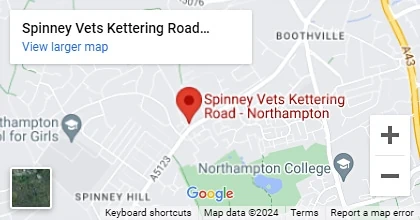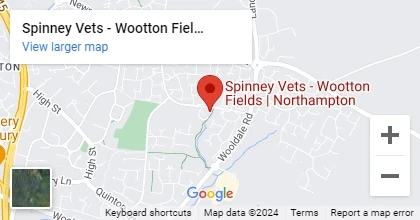Microchipping dogs greatly improves their chances of being found and returned to you if they ever go missing.
Microchipping your dog can bring total peace of mind. No matter how far they wander, you’ll stand a greater chance of finding them should they get lost.
Book a microchipping appointment
Dog Microchipping - how does it work?
In a quick and simple procedure, a tiny, tiny microchip is inserted under your dog’s skin. The chip is smaller than a grain of rice and is inserted between your dog’s shoulder blades. Your dog will experience about as much pain as they do when receiving injections – that is, very little.
Your dog will not be aware of the microchip’s presence once it’s in.
This microchip gives your dog their own unique 15-digit code which is uploaded to a database. When the microchip’s scanned, it can easily be matched to your contact details. So if your dog is ever found missing, a quick scan and check of the database is all it takes to get them home and dry.
Microchipping dogs is one of the most effective means of keeping them safe when they’re out and about. Collars and tags can easily get caught or removed. But microchips are permanent and supremely effective at identifying your dog.
But that said, microchipping dogs is only effective if you keep your contact details up to date. If you move house or change your telephone number after your dog’s gone missing, it’s vital that you inform whoever manages the database you’re registered with.
Do I need to microchip my dog?
While it’s a legal requirement in England and Wales to microchip all dogs over the age of eight weeks, when it comes to dogs, you have a choice.
But given that it’s safe, permanent, and almost always effective at reuniting lost dogs with their owners, for many, microchipping dogs will be a no-brainer.
Even if your dog spends most of its time indoors, you can never totally eliminate the possibility that they might run away. It’s all too easy for them to slip out of an open door or window when you’re not looking. It is also the only way of proving your dog belongs to you if they ever go missing and there is a dispute over ownership.
When should I microchip my dog?
It’s up to you. But though it’s never too late to microchip your dog, it’s a good idea to do so as early as possible – certainly before your dog goes outside for the first time.
Most dog owners wait until the second round of vaccinations before getting a microchip implanted.
Your vet will likely check that your dog’s microchip is still working at all subsequent check-ups. It’s rare that microchips should fail, but it’s reassuring for everyone when you can confirm that they still work.
Book a microchipping appointment
How much does microchipping dogs cost?
Call your local practice for up-to-date costings
I need to rehome my dog...
Just like you need to notify the microchip database if your contact details change, you also need to let them know if you’re rehoming your dog.
The database will likely request signed copies of your dog’s microchip registration documents before they can authorise the transfer of the registered ownership details. Alternatively, they may ask you to complete a new set of forms.
If you’ve got any questions about microchipping dogs, or about any other aspect of dog ownership, feel free to get in touch. Call us on 01604 648221.
Book Your Dog Microchipping Appointment Today
Spinney Vets in Northampton offers professional, pain-free dog microchipping services to keep your pet safe. If your dog ever escapes, loses its collar, or goes missing, their microchip ensures a fast and reliable way to reunite you.
Remember to keep your contact details up to date in the database—this step is essential for a successful reunion if your dog is found. Planning a trip abroad with your pet? Microchipping is also a key requirement for securing the necessary travel documentation.
For more information or to schedule your dog’s microchipping appointment, contact Spinney Vets today. With our friendly team and convenient location, we’re here to help protect your pet.










Pet Help Advice